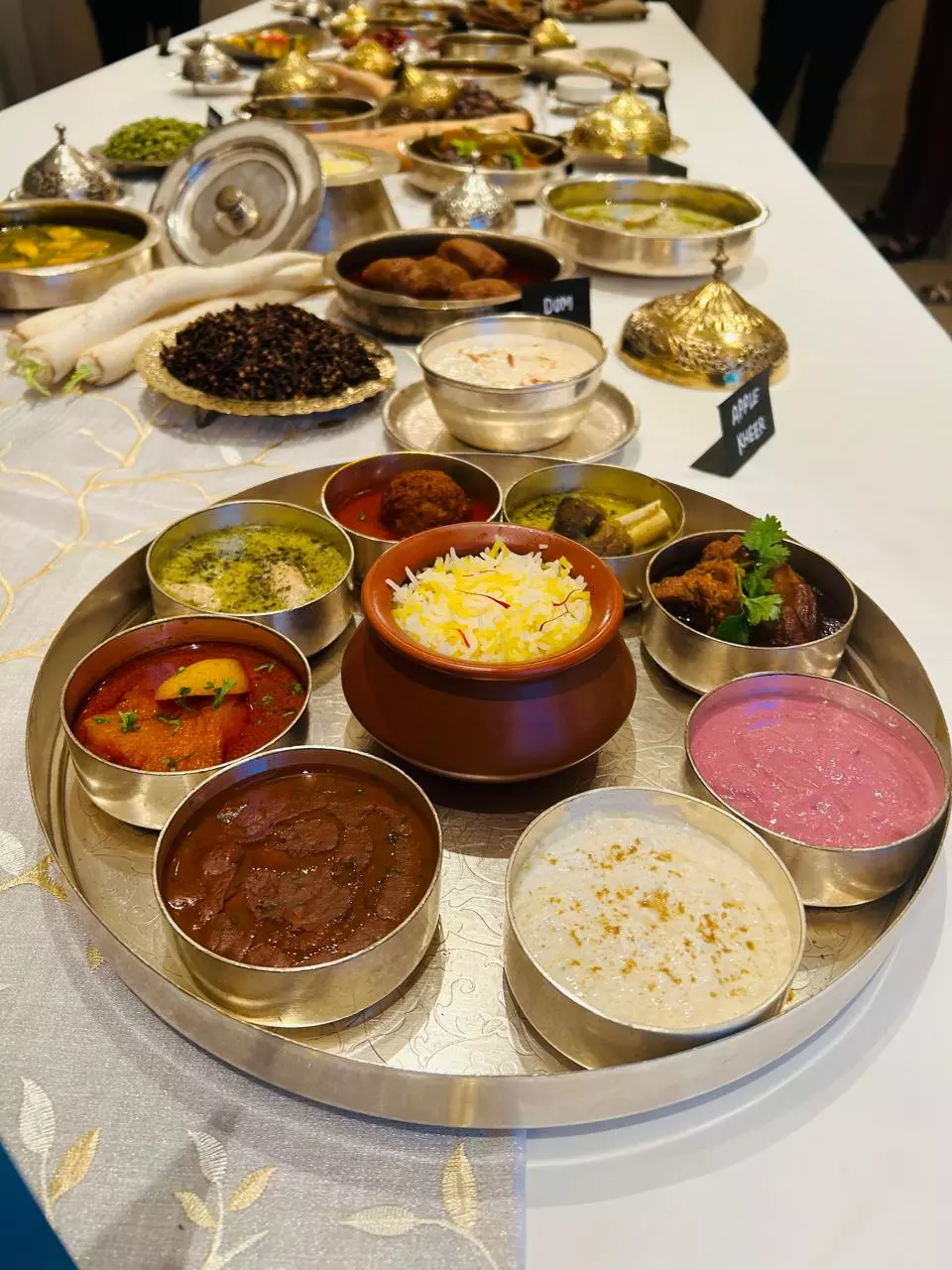Koshur Saal, a Kashmiri Pandit Culinary festival at the The Park, Hyderabad

A yummy Thali served at the feast Picture Courtesy : DC
Koshur Saal (Kashmiri Feast), a culinary festival exhibition was held at The Park, Hyderabad, yesterday. The venue's ambiance enhanced the exhibition, which was organized with great fervor. In addition to being aesthetically pleasing, the show provided a variety of delectable foods.
The first thing that comes to mind when someone mentions Kashmiri food is Wazwan. But there are many other cuisines, vegetarian and Non-vegetarian that people are not aware of as they don't get highlighted much. During the event, the chefs showcased these types of delicacies.
Even though Kashmiri Pandit food is prepared without onions, garlic & tomatoes and has a very straightforward appearance, yet it is flavorsome. The flavor in the dish comes from the raw ingredients and spices such as red chili, fennel powder, cumin powder, dry ginger powder, and hing are the primary spices used in Kashmiri cuisine.
Various Kashmiri dishes were exhibited in the fest, such as Mutton Qaliya, Kabargah , Kokur kaanti, Buzith Gaad (Grilled Fish), Nadur Kabab, Rajma Dal, Palak Nadur (Spinach and Lotus Stem), Dum Olav, Paneer Qaliya, Buzith Chaaman (Grilled Paneer), Nadur Yakhni, Havan Daal or Moong Dal, Kokar Yakhni, Mujj Gaad (Radish and Fish) and Lavas.
Picture Courtesy : DC
Among the dips they served were Doom Chetin (walnut chutney), Dean Chetin (Pomegranate Chutney), and Mooli ka Raita. In the desert, there was Kong Phrini and Apple Kheer.
All the dishes were prepared by Chef Rahul Wali and Chef Sidakpreet Singh Kalra, who have been doing Kashmiri and Punjabi pop-ups, in several states throughout the nation for the past two years.
In an Exclusive Interview with Deccan Chronicle Chef Rahul Wali and Chef Sidakpreet Singh Kalra, they talked about their culinary background, training, and future plans:
Can you tell us about your culinary background and training?
Chef Rahul Wali & Chef Sidakpreet Singh Kalra
Picture Courtesy : DC
Chef Rahul Wali: I have been in this Industry for the past 25 years. I started in 1999 and worked at many hotels in India and outside India as well. Then, I went to Australia for my master's in Gastronomy. I worked there for some time and came back to India and have been working here for the past 17 years.
Chef Sidakpreet Singh Kalra: I have been in this Industry for almost the past 16 years. I started my career in Delhi. I have worked with many hotels and catering companies in India and overseas. For the past two years, Chef Wali and I have been traveling to different states, across India and showcasing the cuisines we have learned and grown up eating.
What inspired you to become a chef?
Chef Sidakpreet Singh Kalra: I would not say that I wanted to become a chef since childhood. But during my Hotel management days, I got more inclined towards Food and Beverage services. In my second year, I got more interested in Tandoor and Tandoori Cuisine. Then gradually developing and learning new skills, here I am.
Chef Rahul Wali: I feel as if I was born into a restaurant. Since I was seven, I used to walk around restaurant kitchens. I have always been interested in food which led me to Hotel Management and then I learned about different types of cuisines.
What is your approach to making a menu?
Picture Courtesy : DC
Chef Rahul Wali: My approach for making a menu is to understand, the history of the food, the region where the food is from, who is the clientele, and where are we serving.
Chef Sidakpreet Singh Kalra: I think there are two types of menus, regional and modern version of a menu. In the regional menu, I completely agree with Chef Wali. In a modern version of menus, we have to play with the colors of the food, the plating, amalgamation of food on the plate. so, that the food looks visually appealing and tasty at the same time. Apart from this, we should also know about the weather we are catering to.
How do you stay relevant with food trends and new cooking techniques?
Chef Sidakpreet Singh Kalra: Social media is a giant thing, nowadays, and for modern trends, we need to go to social media. We also travel and connect with different chefs in different states and countries. Books are also important to understanding food and the history of it. The main thing after all this is skill and practice.
Chef Rahul Wali: I think modernization is very important. We should upgrade ourselves in terms of knowledge. I try to observe and understand what people are consuming, even if it is the weirdest food.
When asked about long-term goals, both the chefs answered that they want to keep on learning and continue what they are doing.
Picture Courtesy : DC
( Source : Deccan Chronicle )
Next Story

